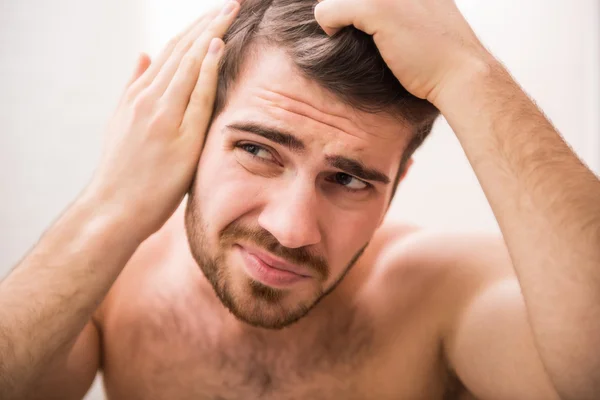Why do we enjoy spending significant amounts of time and money in taking care of our hair? There are various reasons why we choose to style our hair, and it has become a fun way for us to express ourselves. A vital aspect of life is undoubtedly having and maintaining good hair. You may use your hair to create a lasting first impression. Hair fall therapy center in Jodhpur will make you fall in love with your hair for many reasons since they are beneficial to us in various ways. You can gain the confidence boost you’ve always wanted with a stunning haircut. Having gorgeous, healthy hair can make you look better.
You appear decades older than you actually are if you don’t have hair. For males who experience male pattern baldness, this is particularly true. Although female pattern baldness does result in hair thinning, the effects happen far more gradually than they do in men. There is no treatment for this illness.
Symptom of hair losses
The primary symptom of hair loss is the noticeable thinning or loss of hair from the scalp or other parts of the body. Men and women both have different symptoms of hair loss let’s have look on both of them:
Symptom in Men
Men who are experiencing hair loss are most likely to detect a notable thinning or loss of hair from their scalp. Male pattern baldness, which most frequently begins with a receding hairline and thinning at the top of the head, is the most normal kind of hair loss in men. Men may have other signs of hair loss, such as:
- Thinning hair
The hair gradually becomes thinner, weaker, and less dense.
- Bald spots
Men may experience bald spots or patches on the scalp.
- Excessive shedding
Hair may fall out in large amounts when combing or washing.
- Itching or burning scalp
Some men may experience itching or burning on the scalp as hair loss progresses.
- Changes in hair texture
Hair may become dry, brittle, or more prone to breakage as hair loss progresses.
Symptom in Women
The primary symptom of hair loss in women is noticeable thinning or loss of hair from the scalp. Women may experience hair loss in a different pattern than men, with the hair gradually thinning all over the scalp instead of receding at the hairline. Other symptoms of hair loss in women may include:
- Widening part
Women may notice that their hair part is becoming wider, indicating hair loss.
- Excessive shedding
Hair may fall out in large amounts when combing or washing.
- Bald spots
Women may experience bald spots or patches on the scalp.
- Changes in hair texture
Hair may become dry, brittle, or more prone to breakage as hair loss progresses.
- Itching or burning scalp
Some women may experience itching or burning on the scalp as hair loss progresses.
Reasons why someone experiences hair loss
The best hair treatment doctor in Jodhpur will educate you about a number of causes of hair loss. Many typical reasons for hair loss include:
- Androgenetic alopecia
Androgenetic alopecia, also known as Hereditary hair loss, is the most common cause of hair loss in both men and women. It is a genetic condition that can be inherited from either parent and is caused by a combination of genetic, hormonal, and environmental factors.
In men, hereditary hair loss typically starts with a receding hairline and thinning at the crown of the head, eventually leading to baldness. In women, the hair gradually thins all over the scalp and the hairline does not typically recede.
Hereditary hair loss is usually a progressive condition and may worsen over time if left untreated. However, there are several treatment options available at Udaipur skin treatment including medications such as minoxidil and finasteride, as well as hair transplant surgery.
If you suspect that you have hereditary hair loss, it’s best to consult with a healthcare professional or dermatologist to determine the best treatment options for you.
- Medical conditions
Areata alopecia This autoimmune condition results in patches of hair loss on the scalp, face, and other areas of the body. Thyroid condition Hair loss may result from an overactive or underactive thyroid gland. Lupus This autoimmune condition can result in skin sores and hair loss. Hair loss is one of the symptoms of the hormonal condition polycystic ovarian syndrome (PCOS), which also causes acne and irregular periods. Trichotillomania A person with this mental illness rips out their own hair, which causes hair loss. Scalp maladies Hair loss can be brought on by bacterial or fungal diseases of the scalp.
- Hormonal changes
Hair loss may result from hormonal changes brought on by pregnancy, childbirth, menopause, and thyroid issues. Pregnancy Temporary hair loss brought on by hormonal changes during pregnancy is possible, but it normally goes away after giving birth. Menopause Women who go through menopause may experience hair loss due to hormonal changes. thyroid conditions Hair loss can be brought on by hormonal imbalances brought on by thyroid illnesses including hypothyroidism or hyperthyroidism. Women may experience hair loss due to the hormonal condition known as polycystic ovarian syndrome (PCOS). tablets for contraception As a result of the hormonal changes brought on by some birth control tablets, some women may have hair loss upon starting or discontinuing them. steroid anabolics Anabolic steroid use might result in hormonal changes that cause hair loss.
- Nutritional deficiencies
A lack of essential nutrients such as iron, vitamin D, and protein can lead to hair loss. It’s important to maintain a balanced and nutritious diet to promote healthy hair growth. If you suspect that you have a nutritional deficiency that may be contributing to hair loss, it’s best to consult with a healthcare professional or registered dietitian to determine the best course of action. They may recommend dietary changes, supplements, or other treatments to address the deficiency and promote healthy hair growth.
- Stress
Stress can contribute to hair loss in some people. The type of hair loss that is caused by stress is called telogen effluvium. This condition occurs when a significant stressor, such as a major illness, surgery, or emotional stress, causes hair follicles to prematurely enter the resting phase of the hair growth cycle. This can lead to an overall thinning of the hair, as more hair follicles than usual enter the resting phase and fewer are actively growing.
- Hairstyles and treatments
Tight hairstyles such as braids, cornrows, or tight ponytails can pull on the hair and cause damage to the hair follicles, leading to hair loss. Chemical relaxers and hot oil treatments can also damage the hair and cause hair loss if used too frequently or improperly. Even though life isn’t perfect, Dr. Singhi’s hair loss treatment in Udaipur can make your hair perfect.
- Age
While age can be a factor in hair loss, it’s important to note that not all hair loss is related to age. Hair loss can be caused by a variety of factors, including genetics, medical conditions, hormonal changes, and lifestyle factors. As people age, hair follicles may shrink and produce thinner, weaker hair, leading to hair loss.
It is advisable to seek medical advice if you are losing your hair so that you may learn more about the root of the problem and the best course of action for you. Dr. Singhi who offers the best hair transplantation in Udaipur.















